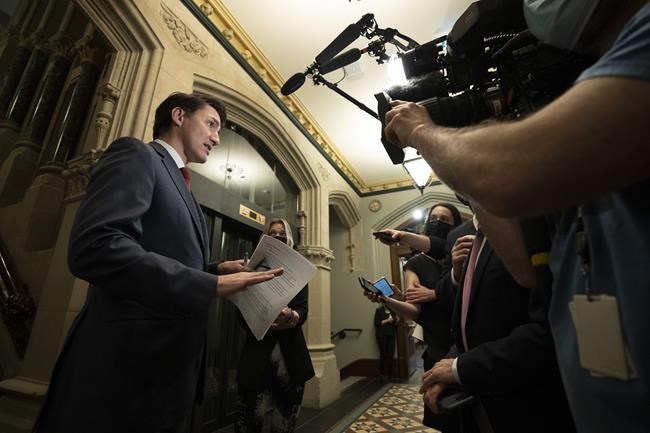Liberal lawmakers on both sides of the Canada-U.S. border are vowing to defend access to legal abortions, but the issue's divergent and divisive history in each country guarantees they'll go about it in very different ways.
Prime Minister Justin Trudeau, long a self-proclaimed defender of progressive values, promised Wednesday to protect the ability of Canadians to safely and legally obtain an abortion, though he wasn't clear how he'll go about it.
The right to an abortion doesn't exist in Canada in the same way it is enshrined in Roe v. Wade, the landmark 1973 decision that has served as a rock-ribbed legal scaffold for reproductive rights champions around the world for nearly half a century.
Abortion is decriminalized in Canada because of a 1988 Supreme Court decision, but no bill has ever been passed to enshrine access into law and it's also not considered a constitutionally protected right under the Charter of Rights and Freedoms.
Americans' constitutional right appears on the verge of collapse: a draft Supreme Court decision, first reported Monday by Politico, suggests the court is poised to overturn the 1973 ruling and restore the ability of states to establish their own abortion laws.
"The freedom of a woman to choose belongs to her and her alone," Trudeau said Wednesday when asked if the government would codify abortion rights through legislation.
Health Minister Jean-Yves Duclos and Status of Women Minister Marci Ien, he continued, are examining the "legal framework" to ensure "the rights of women are properly protected" under both the current and any future government.
On the campaign trail last year, the Liberals promised to introduce regulations under the Canada Health Act to ensure abortion services were both clearly medically necessary and publicly funded.
That promise grew from a disagreement between Ottawa and New Brunswick about whether the province had to fund abortions at Clinic 554, a private clinic in Fredericton. Health Canada has already clawed back nearly $270,000 in transfer funds as a result of that dispute since 2020.
Liberal House leader Mark Holland said "it's too early to hypothesize" what the government may do to protect access to abortions in Canada, including going further than regulations and using legislation to do it.
"I think we need to take a step back and make sure we do it right and that it's not reactionary," he said, adding, "This government is prepared to do everything to ensure those rights are protected."
In Washington, however, Democrats — seized for months by the fear of a looming electoral reckoning in November, now energized by the perfect issue to galvanize their base — aren't mincing their words.
"This is no longer an abstract exercise. This is real as it gets," Majority Leader Chuck Schumer said on the Senate floor Wednesday, promising to hold a vote next week on just such a bill.
It's doomed to fail. Two key swing Democrats — West Virginia Sen. Joe Manchin and Arizona Sen. Kyrsten Sinema — say they will protect the filibuster, a procedural tool that effectively raises the win-lose threshold in the evenly split Senate from 50 to 60 votes.
But with the midterms on the horizon, the point is winning the election, not the vote.
"Every single American is going to see where every single senator stands on protecting a woman's right to choose," Schumer said. "And rest assured, Americans will be watching."
While reproductive rights are clearly in danger in the U.S., access to abortion services in Canada is relatively good, said Kelly Gordon, a political science professor and abortion expert at McGill University in Montreal.
Many advocates fear that any effort to codify that access into law in Canada would risk triggering an erosion of those services, Gordon said.
Limits on how late in a pregnancy an abortion can be performed are determined at the provincial or territorial level in Canada, and enforced by the medical community, not the courts, she added.
"There's no criminal law around that, and that works well for the abortion provision community," Gordon said. "It's doctors that are deciding these term limits, which I think a lot of folks think is where that decision-making power should be."
Despite the differences, abortion remains a politically volatile issue for both countries — one that just detonated in the U.S. on the cusp of a compelling election season.
In Canada, Conservative MPs, warned off by their party leadership from commenting on the U.S. situation, went out of their way to avoid the discussion on Wednesday.
The NDP leader, meanwhile, held a news conference to assert that the Liberals need to do more than talk about protecting a right to choose, and ensure women can access abortions everywhere.
"Rural communities, Indigenous communities, it is impossible to find anything locally so … women are driving hundreds of kilometres," said Jagmeet Singh.
"And while the Liberals are caught up in fighting the Conservatives over the right, neither of them have done anything to meaningfully expand access."
Trudeau defended the government's record on abortion, pointing to a three-year $45-million fund for community organizations to improve access to sexual and reproductive health care information and services for vulnerable populations. And he said the government is investigating barriers to abortion access across the country with a view to fixing it.
But promises made in the last election have thus far gone untouched. The government has promised a $10-million information portal on reproductive health and rights, but there was no mention of it in the federal budget last month.
A promised $10 million for youth organizations to "respond to the unique sexual and reproductive health needs of young people" has also yet to materialize.
This report by The Canadian Press was first published May 4, 2022.
James McCarten and Mia Rabson, The Canadian Press



